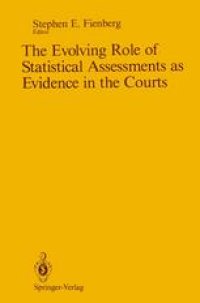
Ebook: The Evolving Role of Statistical Assessments as Evidence in the Courts
- Tags: General Law/Fundamentals, Criminal Law
- Year: 1989
- Publisher: Springer-Verlag New York
- Edition: 1
- Language: English
- pdf
With increasing frequency, the proof of facts in legal proceedings en tails the use of quantitative methods. Judges, lawyers, statisticians, social scientists, and many others involved in judicial processes must address is sues such as the evaluation and interpretation of quantitative evidence, the ethical and professional obligations of expert witnesses, and the roles of court-appointed witnesses. The Panel on Statistical Assessments as Evi dence in the Courts was convened to help clarify these issues and provide some guidance in addressing the difficulties encountered in the use of quan titative assessments in legal proceedings. This report is the culmination of more than three years of research and deliberation. In it, we address a variety of issues that arise in federal and state court proceedings when statistical assessments such as quantitative descriptions, causal inferences, and predictions of events based on earlier occurrences are presented as evidence. We appraise the forms in which such assessments are presented, aspects of their admission into evidence, and the response to and evaluation of them by judges and juries.
This report is a culmination of more than three years of research and deliberation. In it, a variety of issues are addressed that arise in federal and state court proceedings when statistical assessments such as quantitative descriptions, causal inferences, and predictions of events based on earlier occurrences are presented as evidence. We appraise the forms in which such assessments are presented, aspects of their admission into evidence, and the response to and evaluation of them by judges and juries. Our recommendations include several innovations to improve the comprehension of statistial evidence by judges and juries. In addition to jurists, who must evaluate statistical testimony, our report is addressed to lawyers, who may have occasion to draw on statistical testimony or to present factual arguments that incorporate statistical assessments; to statisticians, social scientists, and others who may serve as expert witnesses presenting statistical arguments; and to the research communities in law, statistics, and the social sciences that seek to understand how courts cope with unfamiliar and technically complex information. Our ultimate goal is to improve the legal process.